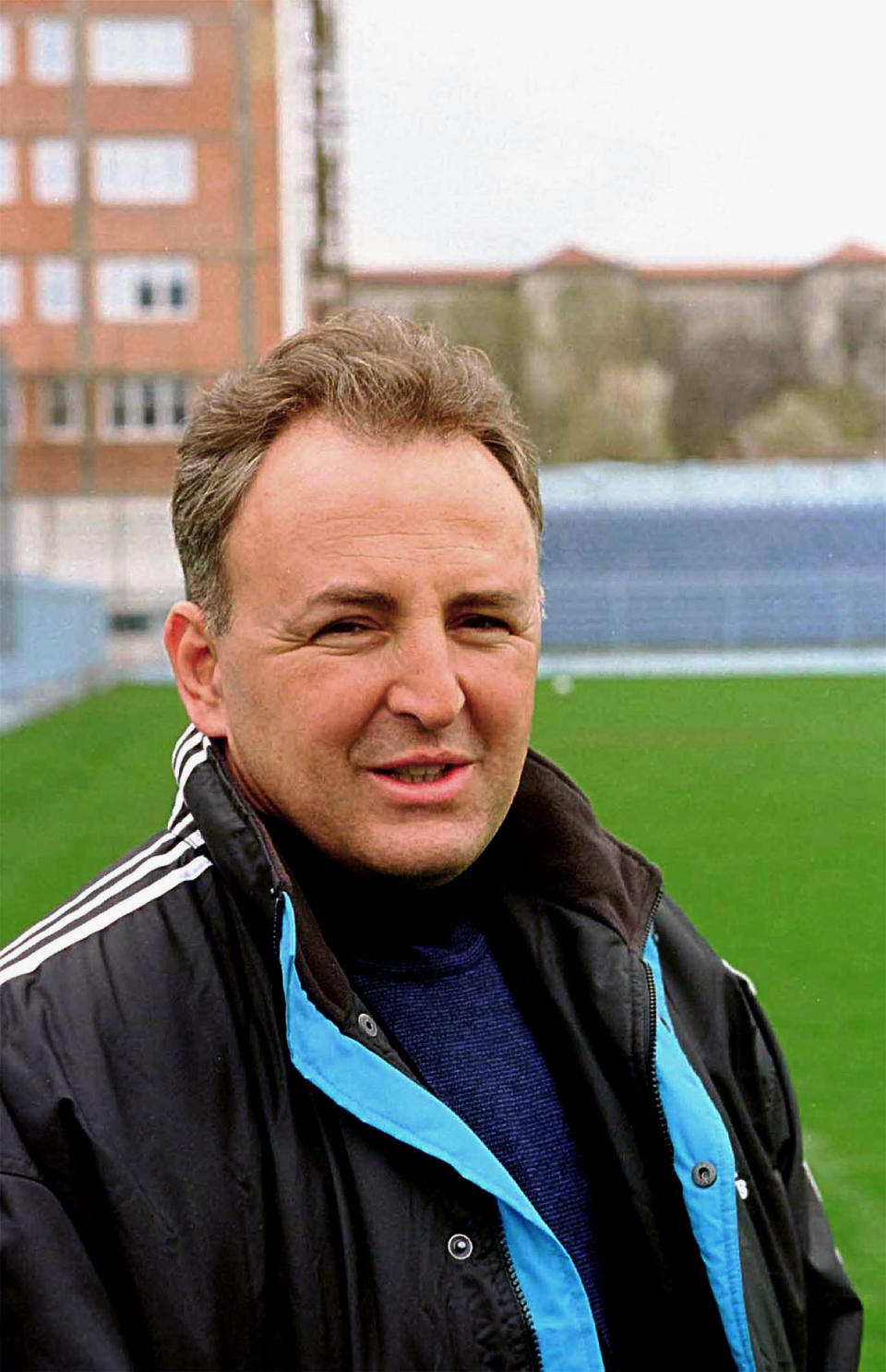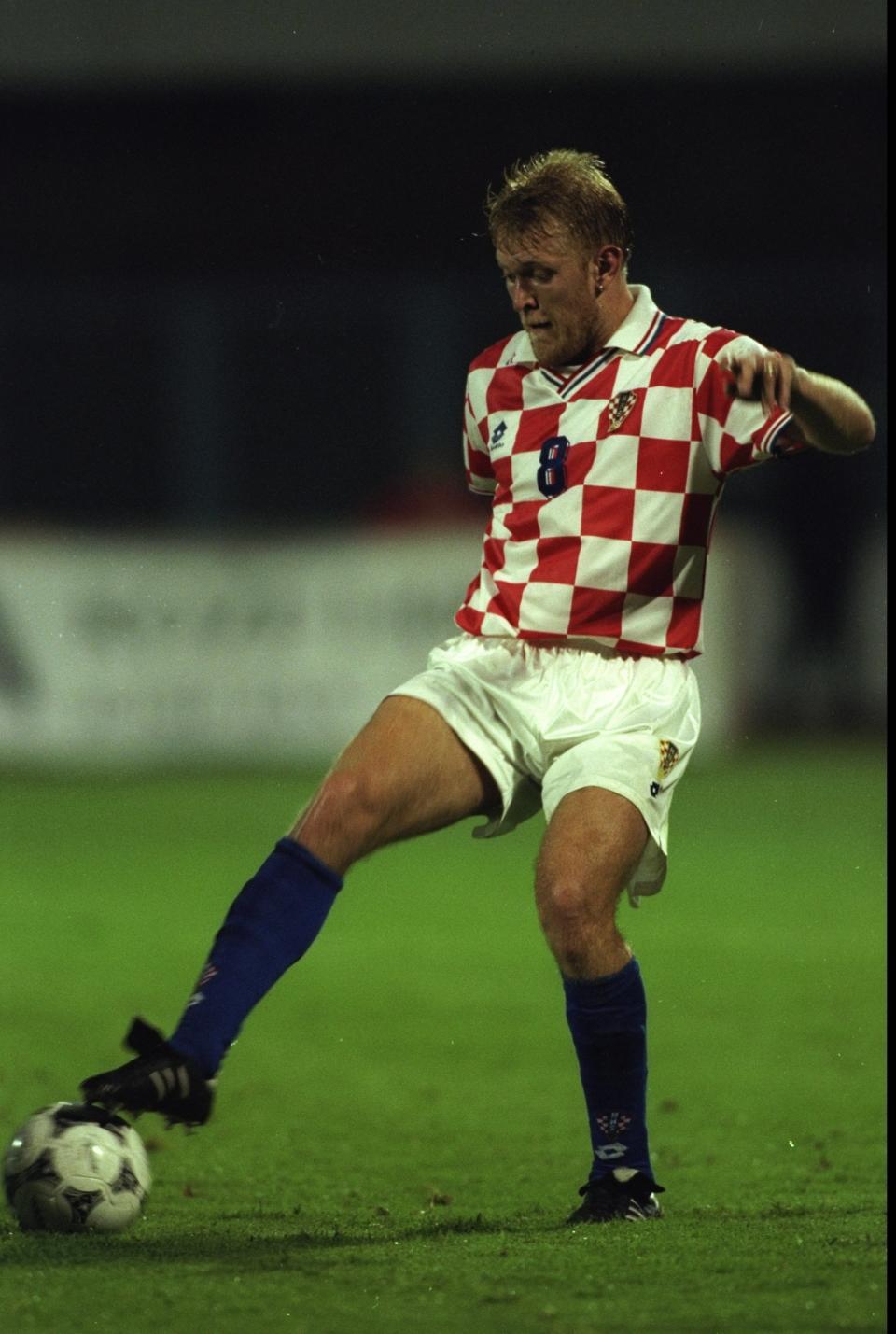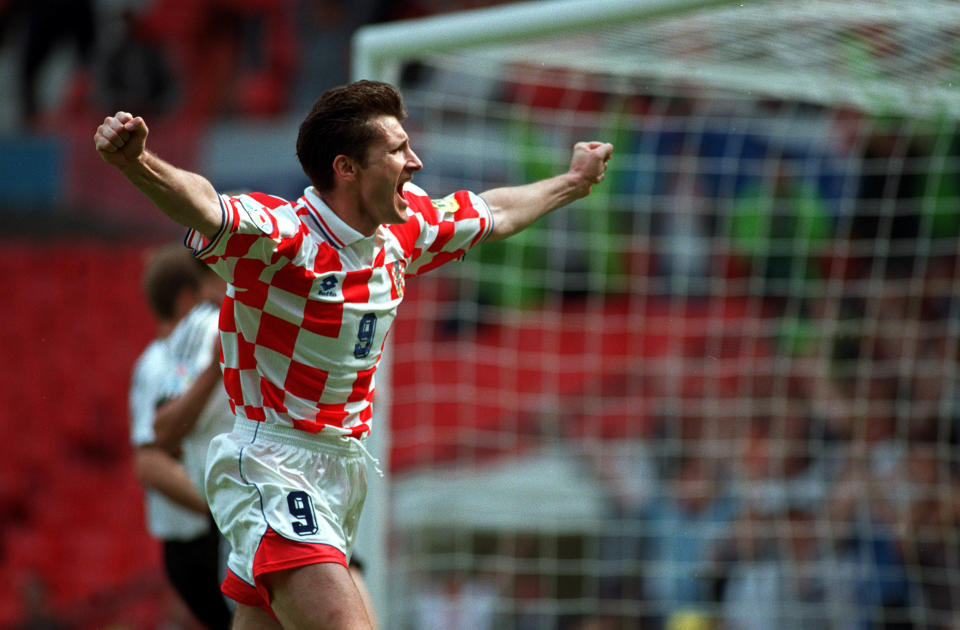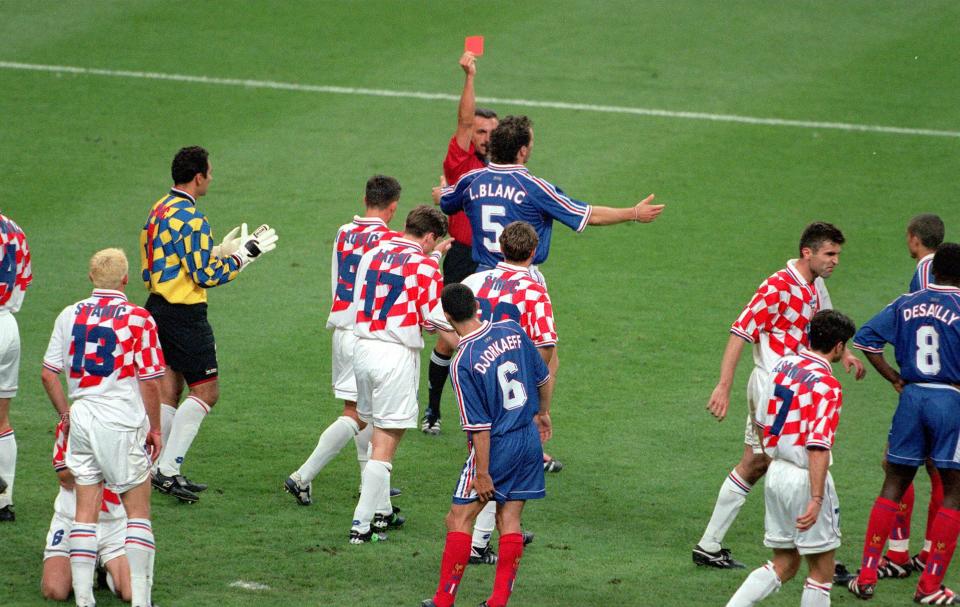Slaven Bilic, Davor Suker and how a newborn Croatia stormed World Cup ‘98

When they came up against Jamaica at the Stade Bollaert-Delelis in Lens for their opening fixture of France ‘98, Croatia found themselves contesting a World Cup match for the first time in their country’s history. While many Croatians had featured at the tournament previously, this was the first time that Croatia had taken part in the competition as an independent nation.
SLIDESHOW: The 32 star players for every World Cup nation (Click image below)
As recently as Italia ‘90, Croats like Davor Suker, Robert Jarni, Zoran Vulic and Alen Boksic had been called up to represent the Socialist Federal Republic of Yugoslavia. Exactly one year and 17 days after the start of that tournament, Croatia declared independence from the doomed Yugoslav federation and the bloody ‘Patriotic War’ began.
The match which sparked a conflict
Many have claimed that the break-up of Yugoslavia began in earnest at a football match. On 13 May 1990, Dinamo Zagreb hosted Red Star Belgrade in a domestic fixture which had hawkish political overtones. The first multi-party elections of the communist era in Croatia had been held not long beforehand, with the ruling communist elite ousted by the nationalist Croatian Democratic Union under new president Franjo Tudman. This coincided with rising ethnic tensions between Croats and Serbs across much of Croatia, mirrored by similar ethnic divides opening up across the crumbling Yugoslav state.
READ MORE: De Gea – Spain in great shape for World Cup
It was against this feverish backdrop that the most successful club in Croatia met the most successful club in Serbia in a Yugoslav league match, held at the Maksimir Stadium in Zagreb. The Delije, Red Star’s hardcore ultras group, travelled to Croatia in their thousands. They were led by Zeljko Raznatovic, also known as ‘Arkan’, a Serbian nationalist, underworld figure and violent criminal who would later be indicted by the International Criminal Tribunal for the Former Yugoslavia for crimes against humanity.

READ MORE: The top footballers who WON’T be at Russia 2018
What resulted was the Dinamo-Red Star riot: a chaotic clash between the Delije and Dinamo’s ultras, the Bad Blue Boys. Street fights before the game continued inside the ground, with fans singing nationalist chants and engaging in increasingly aggressive provocation. Eventually, the Delije tried to smash down the dividing fence between them and their rivals, hurling missiles and torn-off seats as the Serb-dominated Yugoslav police watched on. A counter-attack by the Bad Blue Boys was met with baton charges and tear gas from the police, leading to an escalating riot which lasted well over an hour and left hundreds injured.
The moment which defined the riot came courtesy of Zvonimir Boban, the future AC Milan stalwart and four-time Serie A winner with the Rossoneri. Enraged by the uneven response of the security services to the disorder in the stands, he ended up karate-kicking a policeman who had been assaulting a Dinamo supporter. This made Boban a nationalist icon in Croatia, with his fly-kick graffitied onto walls and incorporated into political murals across the country.
READ MORE: World Cup 2018 – The team by team guide
The Yugoslav league would break apart only a season later, this after Croatian and Slovenian clubs withdrew from the competition. Nationalist sentiment was spurred on by the violence at the Maksimir Stadium and Boban’s show of resistance to the pro-Serbian authorities, though the symbolic importance of the Dinamo-Red Star riot has no doubt been embellished as it has entered into Balkan folklore. Whatever its significance in leading Yugoslavia down the path to war, the riot was evidence of just how fractious the relations between Croats and Serbs had become. In June 1991, Croatia would secede from Yugoslavia and declare its independence, with the situation soon deteriorating into armed conflict.
The Croatian national team is born
The Croatian War of Independence, or ‘Patriotic War’ as it is known in Croatia, would last until 1995 and end in a decisive victory for the newborn state. In the meantime, football remained as important as ever to Croatian identity. While an unofficial Croatian national team played the country’s first ever match in October 1990 – a friendly against the United States which Croatia won 2-1 under the management of former Dinamo striker Drazan Jerkovic – the national side only gained admission to FIFA in 1992 and UEFA a year later. It wouldn’t take long for the fledgling nation to make an impression on the international stage.

READ MORE: France defender Koscielny ruled out of World Cup
At Euro ‘96, the first major tournament for which Croatia was eligible to qualify, the men in red and white chequers got as far as the knockout rounds. Mere months after the end of a war which had claimed tens of thousands of lives and displaced hundreds of thousands of Croats – this not accounting for the ongoing conflict in other parts of the former Yugoslavia – a team fittingly captained by Boban narrowly lost to Germany in the quarter-finals having recorded impressive wins against Turkey and Denmark at the group stage.
READ MORE: James – Colombia eyeing at least World Cup semis
Croatia’s famous chequered shirt was heavily associated with the fight for independence, inspired as it was by the chessboard design of the country’s pre-communist era coat of arms. That made the success of the national team even more significant in the context of the country’s struggle, meaning football and Croatian politics were joined at the hip. If Euro ‘96 had been a great success for the fledgling nation, what came next was even better. Had it not been for two exquisite goals scored by Lilian Thuram, Croatia would have had a shot at winning France ‘98.

Croatia’s dream World Cup debut
So we come back around to the first ever World Cup match in Croatia’s history. With a team laden with players who would go on to earn cultish reputations in English football – Igor Stimac, Slaven Bilic, Robert Prosinecki and Davor Suker among them – the Croats won 3-1 against Jamaica and got their inaugural campaign off to an ideal start. Suker scored the first of six goals at the tournament, an achievement which would see him win the Golden Boot ahead of Gabriel Batistuta, Christian Vieri and Ronaldo. Amazingly, only a few hours before Croatia’s first win, the reconstituted Federal Republic of Yugoslavia had beaten Iran in their first official World Cup match, though the team was now made up exclusively of Serbs and Montenegrins.
READ MORE: World Cup 2018 – England draw ‘favourable’ group after dodging giants
Thankfully, at least as far as the ‘keep geopolitics out of football’ crowd were concerned, Croatia and Yugoslavia were never destined to meet at the tournament. Though both progressed from the group stage – Croatia with victory over Japan and a narrow defeat to Argentina, Yugoslavia with a 2-2 draw against Germany and a 1-0 win over the USA – the Yugoslav side would go out to the Netherlands in the Round of 16. Meanwhile, Croatia overcame the famous bleach-blonde Romanian team which had beaten England in Group G, with Suker deciding the game from the penalty spot. Had Croatia and Yugoslavia managed to set up a knockout-stage showdown, there would have been no mistaking the significance of Zvonimir Boban wearing the captain’s armband for the Croats.
Remember @HNS_CFF's run to the #WorldCup semi-finals at France 1998 as debutants? How far do you think they'll go at Russia 2018?
Follow @FIFAWorldCupCRO for exclusive coverage of Croatia pic.twitter.com/kJTpYUi0TL
— FIFA World Cup (@FIFAWorldCup) June 11, 2018
READ MORE: 5 of the most lethal groups of death at the World Cup
Next up, Croatia faced the might of Germany in the quarter-finals. That proved to be no problem for the Croats, who benefitted from a red card for Christian Worns and stormed to one of their most impressive victories to date. Robert Jarni scored a thunderbolt opener on the stroke of half-time before Goran Vlaovic repeated the trick deep into the second half. Suker then delivered the inevitable piece de resistance with a beautiful solo goal to make it 3-0 to the World Cup debutants.
The dream fades
That left Croatia facing only one more obstacle in their path to the final. It was an enormous obstacle, unfortunately, in the form of tournament hosts France. Orchestrated by Zinedine Zidane in the midfield, buttressed by legendary defenders like Lilian Thuram, Laurent Blanc, Marcel Desailly and Bixente Lizarazu, Les Bleus were a legendary team in the making and had just beaten a vintage Italy side in the quarters.
READ MORE: Everything you need to know about FIFA 18 World Cup
Though Suker opened the scoring after racing through the French back line and slotting low under Fabien Barthez, Thuram was the unlikely source of Les Bleus’ salvation. He notched the only two international goals of his career to make it 2-1 to France, a tense scoreline which the hosts were forced to defend with their lives late in the game. They were not helped by the first and only red card in Laurent Blanc’s professional career, this after Slaven Bilic had responded theatrically to a shove to the face in the box. That made Bilic a public enemy in the French press and left Blanc suspended for the final, though it was ultimately not enough to change the course of the game.

READ MORE: France stars snubbed for the World Cup
Having come so close to reaching the World Cup final the first time of asking, Croatia had to settle for third place after dispatching the Netherlands at the Parc des Princes. It was there that Suker scored his sixth and final goal of France ‘98. Though he and his teammates had fallen at the penultimate hurdle, they had done enough to go down in World Cup folklore. For a nation which had endured such a violent birth only a few years previously – and for which football was of such symbolic importance – it was an iconic feat which would resonate loudly with future generations.

 Yahoo Sport
Yahoo Sport 







































